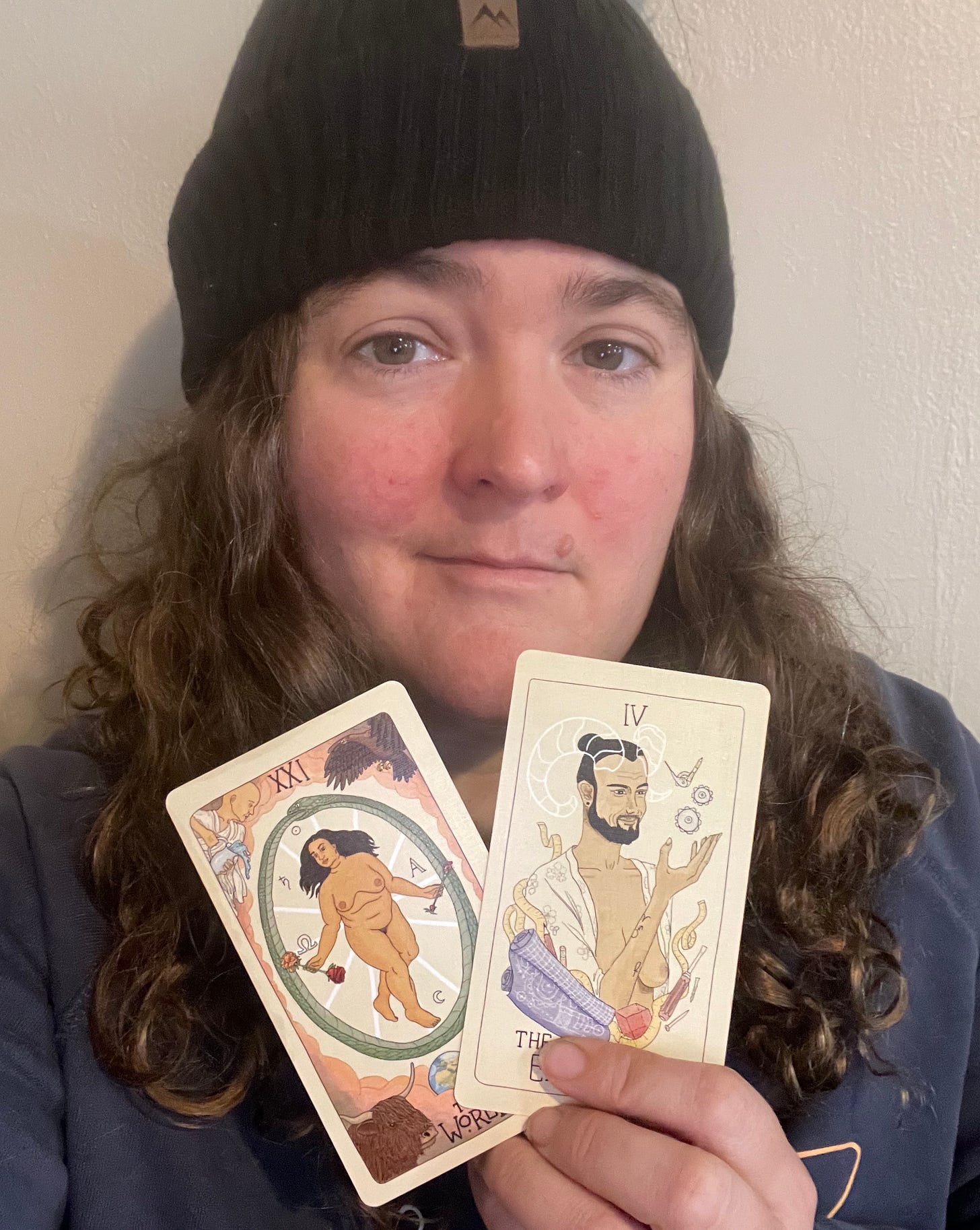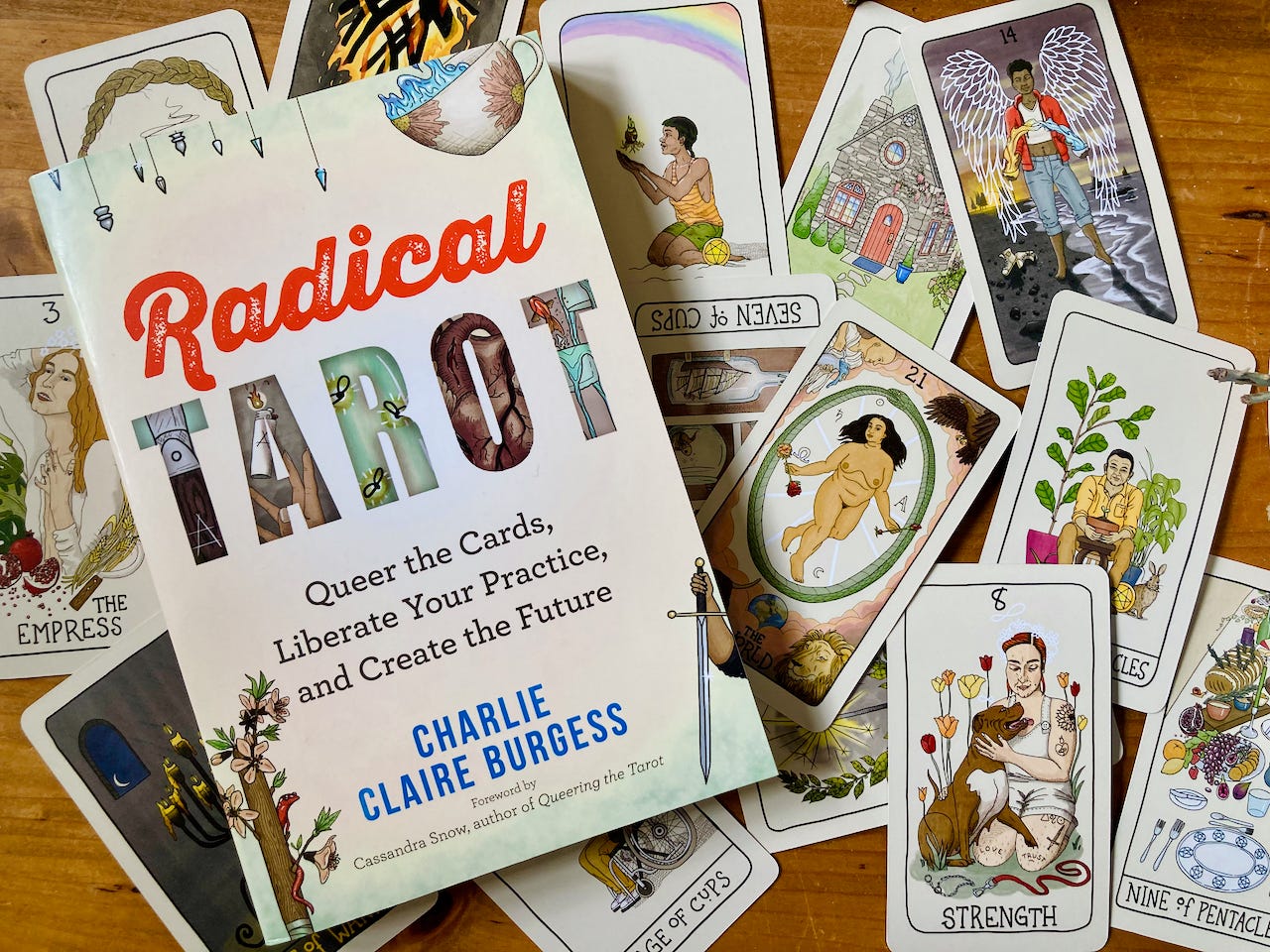In one word, my spirituality is Queer.
Charlie Claire Burgess Responds to the Radical Soul Questionnaire
I spent a decade as an atheist, even though I could always feel a spiritual dimension pulsing against the membrane of my narrow reality like humidity before the storm breaks. Reconnecting to spirituality after religious trauma was a long road, but I value it because it initiated me into a more liberated, wilder, and deeply felt spirituality.
A couple of years ago, my joyfriend gifted me the Fifth Spirit Tarot deck for Christmas, and I have been hooked ever since.
I didn’t realize how much inclusive representation of the cards would change my experience with tarot. I feel more open to messages, more held and cared for. I now use the deck for ancestral draws, and something really magical happens communing with my ancestors using this deck. (I should write about it.) So when I saw Charlie was releasing a new book, I really wanted to feature them on Radical Soul and introduce y’all to them. To my delight, they said yes.
Charlie Claire Burgess is a queer and trans-nonbinary tarot practitioner, writer, illustrator, and witch. They are the author of Radical Tarot, a guide to reading tarot for personal and collective liberation, and the creator of two tarot decks (so far): Fifth Spirit Tarot, a queer and inclusive deck for a world beyond binaries; and The Gay Marseille, a cheeky, queer update on the classic Tarot de Marseille. They are currently at work on their next book, Queer Devotion (Hay House 2025), an exploration of the queer divine in deities and figures of myth and legend that opens pathways for LGBTQIA2S+ people to revere the sacred in themselves. Charlie lives in Portland, OR, with their partner, their one-eyed pug Apollo, and a whole lot of houseplants. Find them online at thewordwitchtarot.com.
Can you loosely define your spiritual identity? (We won’t hold you to it)
My spirituality is curious, marginal, and always transforming. It’s playful and reverent, divergent and rooted, subversive and devoted. In one word, my spirituality is Queer. I was raised in the church in the Bible Belt, and because of that I deeply mistrust institutions and anything with a whiff of dogma. After that, I spent a decade as an atheist, even though I could always feel a spiritual dimension pulsing against the membrane of my narrow reality like humidity before the storm breaks. Reconnecting to spirituality after religious trauma was a long road, but I value it because it initiated me into a more liberated, wilder, and deeply felt spirituality. Now, I identify as a witch, not only because I do magic and divination, but because the witch is inherently queer and fringe-identified, working on the margins, caring for the sinners and outcasts, happily outside the status quo and therefore threatening to it. My gods are the gods of the wild places and sidewalk cracks, of the in-between and underneath, of gender alchemy and transformation. I jokingly-not-jokingly call myself a gender anarchist, and I suppose I’m a spiritual anarchist too.
Who has challenged and evolved your beliefs?
Growing up in the church made me a strong skeptic of anything religious or spiritual, so the people who have challenged me most are the ones who have dared me to believe at all. My friend Emily is the one who reintroduced me to witchcraft and paganism as an adult, and it was through conversations with her that I became brave enough to risk belief again. A different friend—now my spouse—reintroduced me to tarot and inadvertently opened the floodgates to all the magic and spiritual connection I’d been holding back all those years out of fear. Now I have friends who talk to spirits, a friend who remembers past lives on different planets, a friend who reads 600-year-old grimoires and practices ceremonial magic. I don’t necessarily hold the same beliefs or practice the same magic they do, but I believe them. Each of them reminds me that I don’t have all the answers. Each of them challenges me to become more open to this wild, strange, numinous existence. I don’t think I’ll ever not be a skeptic—and I think skepticism is vitally important in general—but I can be a skeptic and a believer at the same time. My friends challenge me to be ever more generous and daring in my own experience of the magical, spiritual, and divine.
Do you have any spiritual practices?
I have many! I revere the Queer Spirit in all things, and I try to practice that devotion in queer ways. (My next book, Queer Devotion, is about this!) I work with a DIY pantheon of goddexxes, saints, and spirits as facets of Queer Spirit, including Mercury/Hermes, Dionysos, Jehanne D’arc (Joan of Arc), and Pope Joan, to name a few. Most recently, I’ve started a devotional practice with Mary as Our Lady of Outcasts in which I pray a queered version of the rosary. This has been an especially radical and healing practice as it both connects me to my Catholic ancestors and reclaims a tool from Christianity for queer spiritual workings. (It’s also been the scariest and most tender thing I’ve done, due to the aforementioned religious trauma.) Using tarot is a spiritual practice for me, one that is quintessentially queer, liberatory, and creative—which I write about in Radical Tarot. I’m also very interested in making the profane sacred and the sacred profane as an act of queer devotion, and in non-traditional offerings, DIY rituals, and activities such as going to a protest, making art, or doing drag as spiritual practices.
The Radical Tarot guide and the Fifth Spirit Tarot deck are both available today.
What is one way you see yourself as radical?
I mean, I’m a pansexual trans-nonbinary tarot reader and witch, but I think what truly makes me radical is that I believe in a different world. I believe the world we know—the world ruled by white supremacist, colonialist, capitalist patriarchy—not only must fall but will fall. I believe that anything built upon the oppression and subjugation of other people or the extraction and abuse of the earth’s resources and its creatures is not sustainable and is ultimately doomed to fail. And I believe that the future must of necessity be queer, by which I mean radically divergent from what has become the norm, and trans, by which I mean radically transformed and transforming, if we humans are to have any hope of survival. (I want to credit Tyson Yunkaporta, Bayo Akomolafe, adrienne maree brown, José Esteban Muñoz, and Susan Stryker as being instrumental in my thinking here.) I know that seems bleak and scary, but if we can step beyond the terror of losing the known world, we can begin to imagine other ways of living on the planet and relating to one another that are sustainable, connected, equitable, and just. And how beautiful that world might be!
What grounds you?
If you can’t tell, I live very much in my head, lol. In addition to being an Aquarius sun, Gemini moon, and a writer, I also struggle with dissociation due to dysphoria and CPTSD. (Though the dysphoria has gotten infinitely better since top surgery!) Being present in my body has historically been an unpleasant experience, so grounding can be a struggle for me. However, things that help include walking my dog, admiring neighborhood flowers, being in community with friends, shuffling tarot cards, and making anything with my hands—creating art, working in the garden, even cleaning and cooking (though I admit my partner does most of the cooking, thank goddexx). Good, simple tasks that reconnect me to the present moment.
What gives you hope?
The queers. The visionaries. The activists. Anyone and everyone who is breaking the mold of their conditioning. The deep thinkers asking the hard questions. The brave souls standing up to power. Drag queens and kings with megaphones. Parents teaching their kids body autonomy. People finally learning to say “I’m sorry.” Queers and Black feminists and Indigenous activists and unionized workers and disability activists and women standing together in solidarity because our liberation is intertwined. The lovers, poets, artists, witches, dreamers who know there is more to life than this and who are making the dream real, every day.
What’s one lesson you keep having to relearn?
Perhaps it’s no surprise for a queer from the Deep South, but somewhere along the way I deeply internalized that I am bad, shameful, unworthy, wrong. Even though I knew it wasn’t true, it sank in anyway like chemical runoff polluting the water table. This has manifested in many many ways over the years—perfectionism, people-pleasing, feeling like a fraud, pushing myself to extremes to “earn” my existence, and more. (Now I recognize this as more of white supremacy’s insidious programming.) So I am constantly relearning that I am good. I am worthy of pleasure, rest, love. Conformity is not belonging, and approval is not acceptance. It’s okay to make mistakes—in fact, it’s great to make mistakes because every mistake is an opening for growth. Pissing people off is sometimes a good thing. Perfection does not exist. If these statements sound like mantras, it’s because I have to repeat them to myself all the time!
What advice do you have for others struggling with what to believe in?
It’s okay to change your mind. There is no getting it “right,” and the only way to get it “wrong” is to use your beliefs to harm others. Stay curious. If something feels challenging or scary, it’s usually worth investigating. Read widely, but don’t believe everything you read. If anyone tells you they have the one true way or the one true god, they don’t. If someone makes you feel stupid for believing what you believe, they’re the stupid one (and an asshole). There is no recipe for belief, spirituality, or devotion. You do not have to burn the specific incense, say the prescribed words, offer the traditional offerings, but you can if you want to. Make it up. Feel it out. Experiment. Listen. You do not have to have all the answers, but you have to ask the questions.




